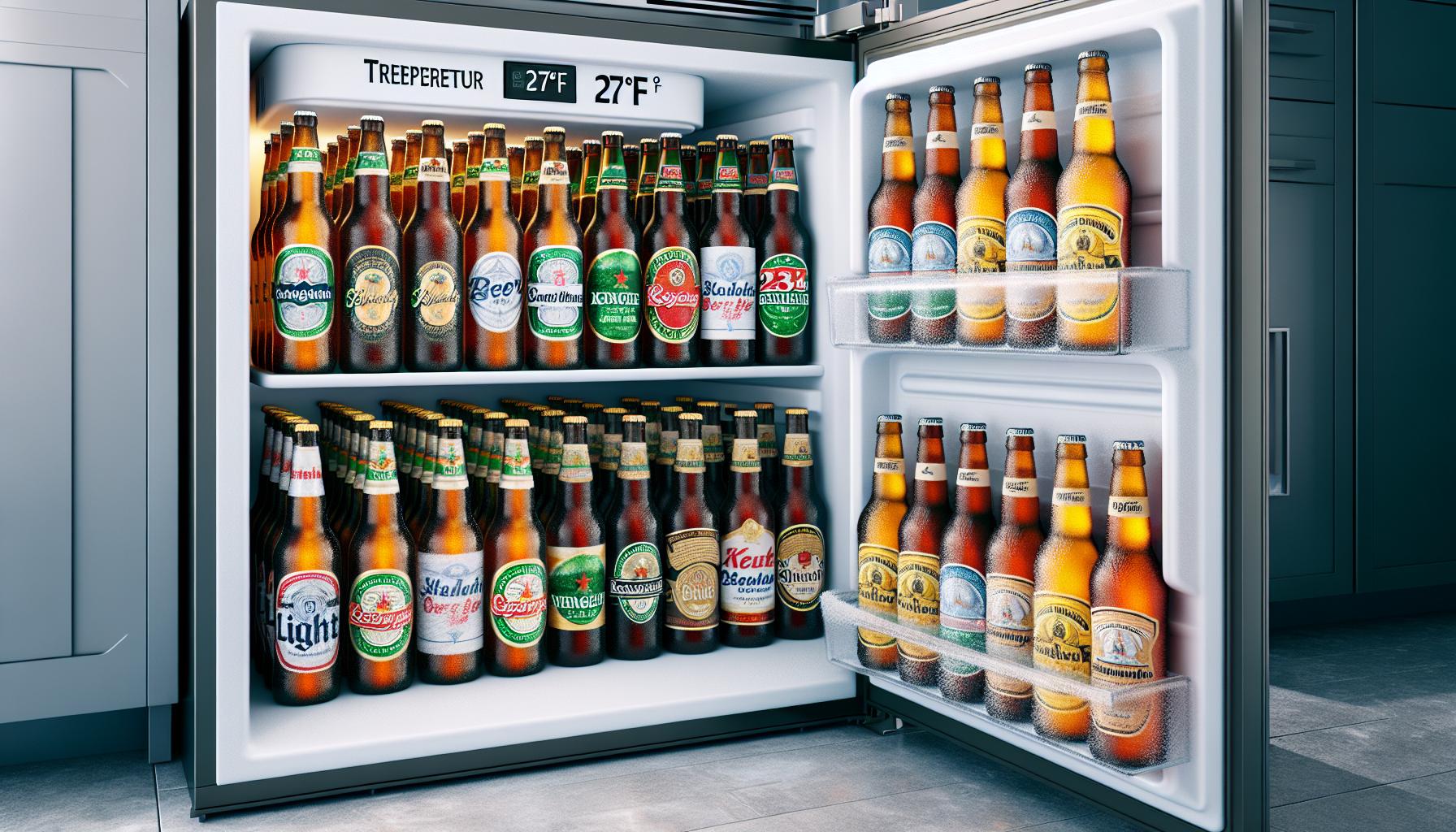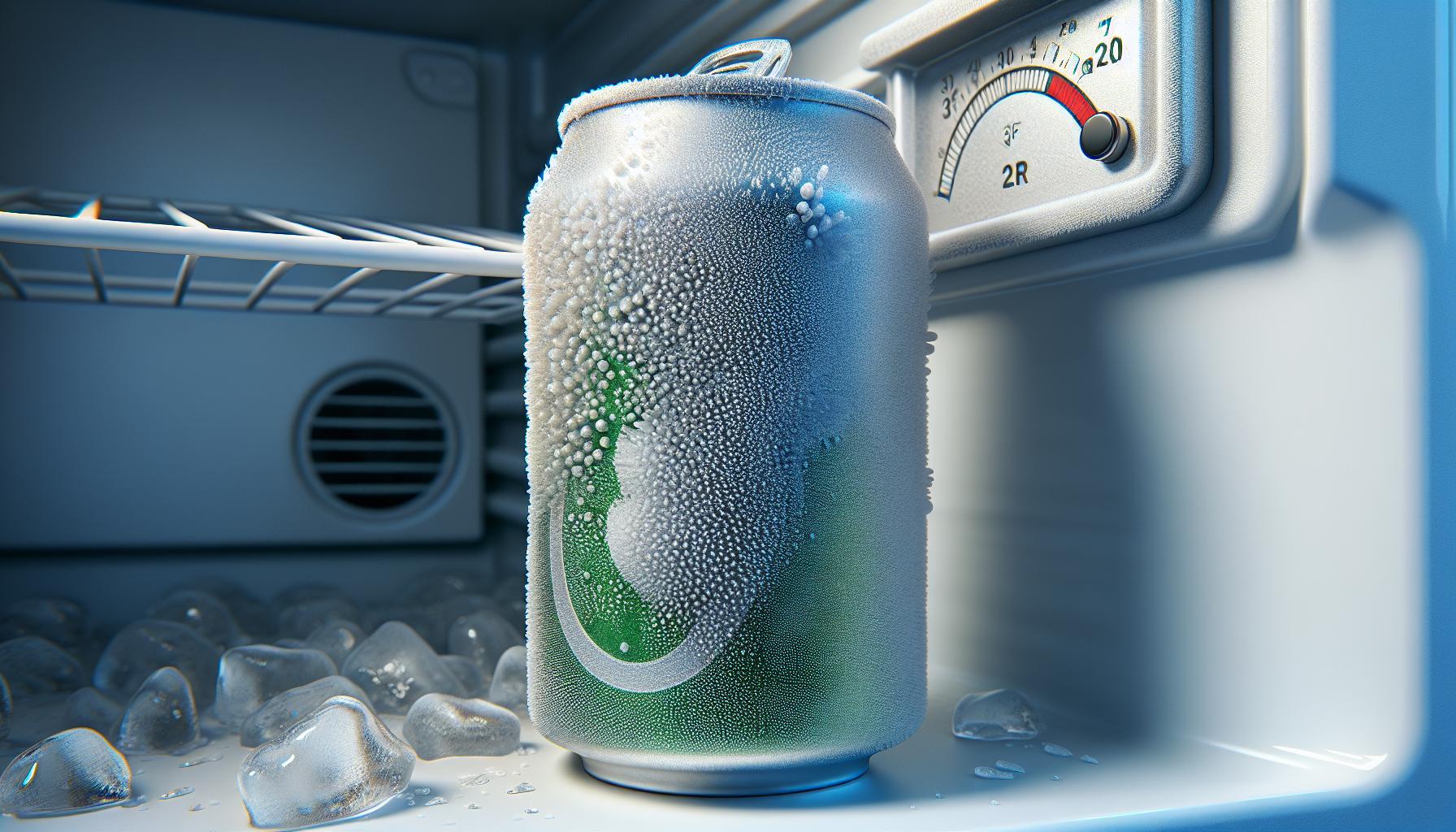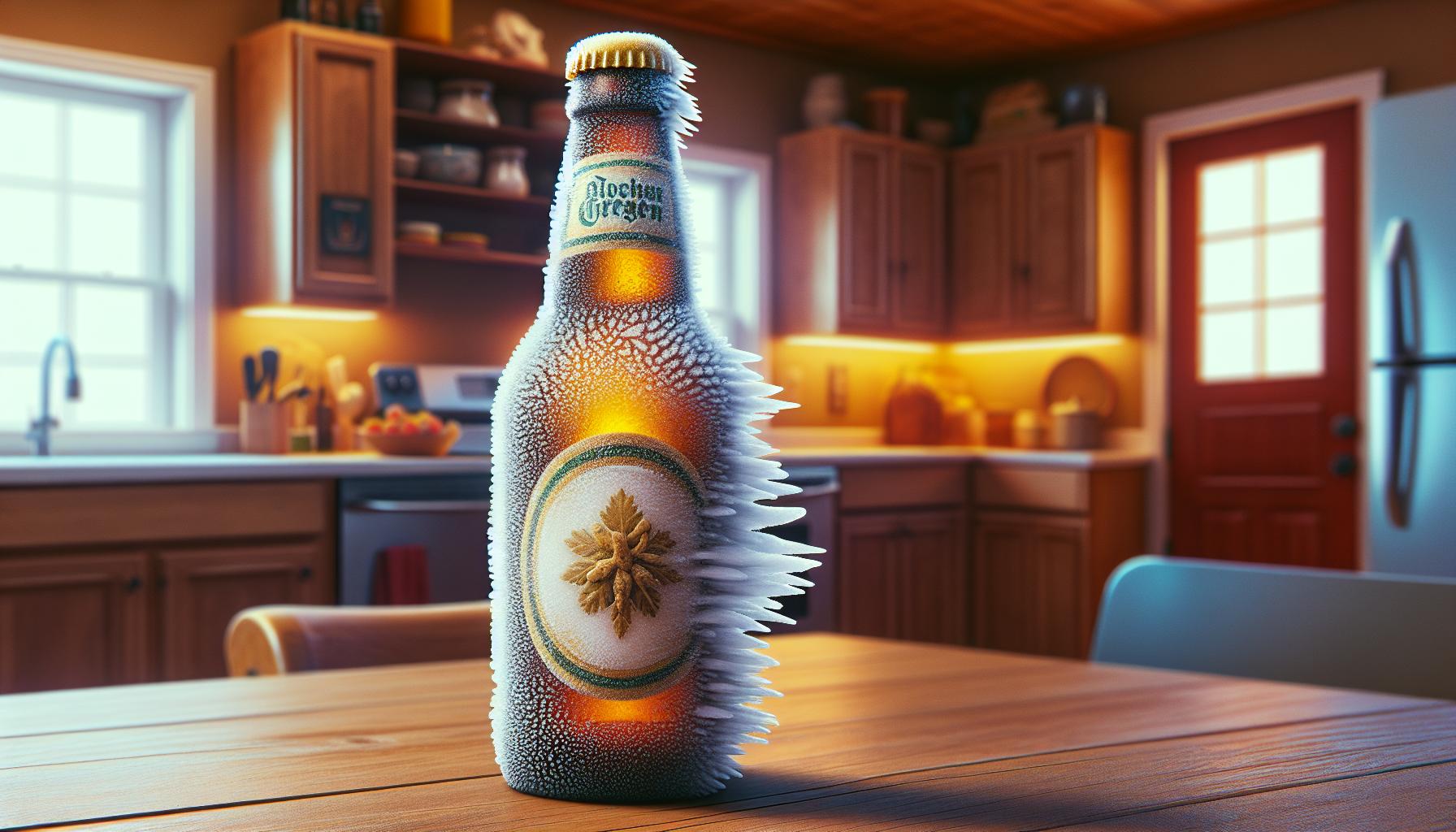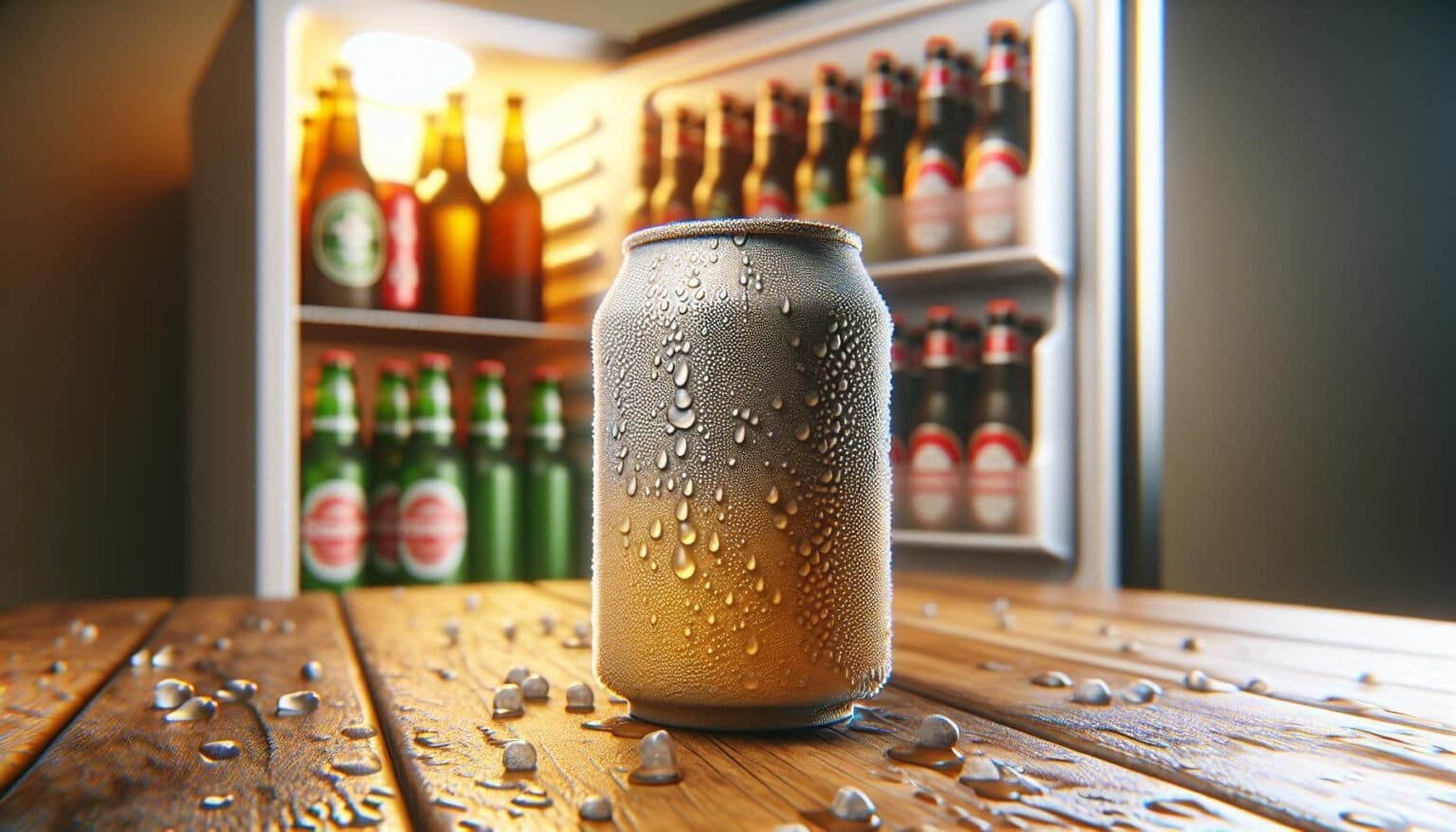Ever left a beer in the freezer for a quick chill, only to find it frozen solid later? The freezing time for beer depends on several factors including alcohol content, container type and freezer temperature. Beer typically begins to freeze at around 27°F (-2.8°C) due to its alcohol content – slightly lower than water’s freezing point.
A standard 12-ounce beer will start to freeze in about 2-3 hours when placed in a typical home freezer set to 0°F (-18°C). However, the exact freezing time varies based on the beer’s alcohol percentage, with higher ABV beers taking longer to freeze.
Understanding beer’s freezing dynamics isn’t just about preventing frozen messes – it’s essential knowledge for achieving the perfect drinking temperature. Whether you’re hosting a party or enjoying a cold one after work knowing these freezing times helps prevent ruined beverages and potentially dangerous exploding bottles.
“1. Place beer in freezer (unopened)
Placing an unopened beer in the freezer creates distinct changes at specific time intervals. During the first 2 hours, the beer reaches an extremely cold temperature while maintaining its liquid state. Ice crystals begin forming at the 3-hour mark, signaling the start of the freezing process.
| Time in Freezer | Beer State | Container Status |
|---|---|---|
| 1-2 hours | Very cold, drinkable | Intact |
| 3-4 hours | Partially frozen | Risk of distortion |
| 4+ hours | Completely frozen | Risk of explosion |
The freezing timeline depends on three key factors:
- Freezer temperature setting
- Beer’s alcohol content (ABV)
- Container material insulation
A standard beer with 4-6% ABV starts crystallizing at 28°F (-2°C). The container experiences pressure buildup after 4 hours, leading to potential cracking or bursting from ice expansion. Leaving beer in the freezer beyond the recommended time creates safety hazards from exploding bottles or cans.
2. Set temperature to 27°F

Setting a freezer temperature to 27°F (-3°C) creates the optimal condition for controlled beer cooling. At this temperature, beer remains in a semi-frozen state that preserves its flavor profile without creating ice crystals.
Beer freezes at different rates based on its alcohol content:
- Light beers (3-4% ABV): Freeze in 2 hours
- Standard beers (5-6% ABV): Freeze in 2.5 hours
- Craft beers (7-10% ABV): Freeze in 3+ hours
| Beer Type | Starting Temp (°F) | Time to Freeze |
|---|---|---|
| Light | 70°F | 2 hours |
| Standard | 70°F | 2.5 hours |
| Craft | 70°F | 3+ hours |
Setting the temperature precisely at 27°F slows the freezing process compared to standard freezer temperatures of 0°F (-18°C). This temperature setting provides a 15-20 minute buffer period to retrieve the beer before ice crystals form. The slower freezing rate allows for better temperature control reduces the risk of bottle explosion from rapid freezing.
3. Check after 2-2.5 hours

At the 2-2.5 hour mark, beer enters a critical phase of the freezing process. Regular beers with 4-6% ABV show the first signs of ice crystal formation as the temperature approaches 28°F (-2°C). Opening the freezer reveals:
- Small ice crystals floating near the top of the container
- Slightly slushy consistency throughout the liquid
- Beer remains drinkable but requires immediate removal
- Bottle or can feels extremely cold to touch
A quick temperature check during this timeframe indicates the beer’s temperature hovers just above its freezing point. This creates an optimal window for removing the beer before complete freezing occurs. Lighter beers with lower alcohol content freeze faster, while craft beers with higher ABV percentages maintain their liquid state longer.
Monitoring the beer at this stage prevents:
- Bottle explosion from pressure buildup
- Loss of carbonation
- Compromised flavor profile
- Container damage from expanding ice
The beer’s texture changes noticeably during this period, developing a thicker consistency that signals the approaching freezing point. This stage serves as the final warning before complete solidification begins.
4. Remove before completely frozen

Removing beer from the freezer at the right moment preserves its quality and prevents bottle explosions. The optimal time to remove beer occurs when the temperature reaches 28°F (-2°C), just as ice crystals begin forming. Here’s a simple monitoring guide:
- Check after 2 hours for light beers (3-4% ABV)
- Monitor at 2.5 hours for standard beers (5-6% ABV)
- Watch closely at 3 hours for craft beers (7-10% ABV)
Look for these critical signs that indicate it’s time to remove the beer:
- Small ice crystals floating near the top
- Slightly slushy consistency
- Noticeable texture changes
- First signs of crystallization
The beer remains safe to drink during the early crystallization phase while maintaining carbonation. Removing the beer at this stage prevents permanent damage to its flavor profile from complete freezing. Setting a timer based on the beer’s ABV percentage creates a 15-20 minute buffer before irreversible freezing occurs.
5. Never freeze longer than 3 hours”
Beer left in the freezer past 3 hours risks permanent damage due to complete freezing. At precisely 3 hours, most standard beers (4-6% ABV) develop ice crystals throughout the liquid. Positioning beer in a freezer set to 0°F (-18°C) creates a critical timeline:
• 2 hours: Initial ice formation starts
• 2.5 hours: Slushy consistency develops
• 3 hours: Complete crystallization begins
• Beyond 3 hours: Risk of explosion increases
The expanding ice creates dangerous pressure inside sealed containers at the 3-hour mark. A standard 12-ounce beer bottle expands by 9% when frozen solid, leading to potential glass breakage or can rupture. Craft beers with higher alcohol content (7-10% ABV) maintain liquid form slightly longer, but the 3-hour limit remains a safe benchmark for all beer types. Setting a timer at 2.5 hours provides a safety buffer to remove the beer before reaching the danger zone.
| Beer Type | Safe Freezer Time | Risk Zone |
|---|---|---|
| Light Beer (3-4% ABV) | 2 hours | 2.5+ hours |
| Standard Beer (5-6% ABV) | 2.5 hours | 3+ hours |
| Craft Beer (7-10% ABV) | 3 hours | 3.5+ hours |



